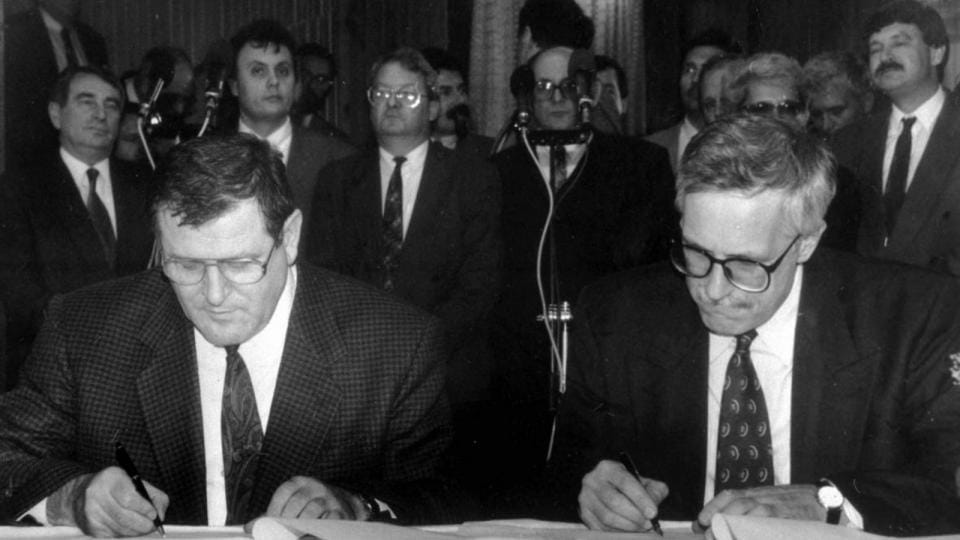The State and The Construction of Social Reality
On the Performative Power of the State’s Bureaucratic Machinery
Very short summary: This essay reflects on how the state and its bureaucratic machinery can shape social reality. The state is unique among human institutions for its performative power. This power is however not unlimited and its use can have adverse consequences.
My wife and I have been spending a week of holidays in Central Europe, between Kraków in Poland and the south of Slovakia. We spent a night in the small town of Tatranska Javorina, in the Tatra Mountains, more specifically in the Hotel Montfort. This hotel is special for several reasons. First, its location (a few hundred meters from the official Slovak Presidential house) and its fantastic view of the Tatra Mountains. Second, its communist architecture and style. Third, its history. The hotel was apparently among the most favored destinations of the communist Czechoslovak nomenklatura and was indeed, until the fall of the Soviet Union, reserved for the political elite. The hotel welcomed illustrious communist guests, such as Fidel Castro in 1986. Even more significantly, as indicated on the website of the hotel, it is here, in the so-called “Red Lounge,” that the documents finalizing the division of Czechoslovakia were signed by Vladimir Meciar and Vaclav Klaus.[1]
The Hotel Montfort viewed from the back (photo from the hotel website).
Learning this can only stimulate the thinking of a social scientist and philosopher. How can two persons signing a bunch of documents in the lounge of a hotel, lost in the mountains, change some aspects of social reality as fundamental as the existence of a state? When I visited the room, I immediately thought of the work of the philosopher John Searle.[2] A philosopher of language and mind, Searle has devoted most of his latest writings to inquiring into the “construction of social reality,” as one of his books is titled. I shall not attempt to summarize Searle’s account here, but I want to explain what insights it gives to understand an act such as the separation of a state into two distinct entities, and also what it seems to overlook.
Searle views what he calls “social facts” as being as objective as “brute facts.” There is no real difference between the fact that when you cross the Danube at some specific point, you leave Hungary and enter Slovakia —a social fact— and the fact that Mount Everest is taller than Mont Blanc. Both can be objectively evaluated as true or false. However, there is one real difference. Brute facts such as the height of mountain ranges are independent of our beliefs, representations, and acts. Whatever we think and do, this will not affect the fact that this mountain is taller than this one. Social facts are different. The fact that such a river counts as a border or that such a piece of paper counts as money depends on what we believe about this river or this piece of paper, and on how we act based on this belief.
Vladimir Meciar and Vaclav Klaus officializing Czechoslovakia separation in the Red Lounge (source).
That may sound contradictory. If social facts depend on what we think and do, that means that they are subjectively constructed. After all, if no humans were on Earth, there would be no borders or money to start with. These facts only exist through human minds. This is perfectly right. However, Searle’s point is different. Consider two examples related to borders and money. Suppose that you’re walking somewhere around the Three-County Cairn where Finnish, Norwegian, and Russian borders meet. You freely enjoy the possibility of moving from the Finnish to the Norwegian territories and at some point, you decide to set foot on Russian soil. You’re immediately arrested. This is as objective as getting your feet wet when you walk into water without appropriate shoes. Or suppose that while traveling in the U.S., you try to buy goods in exchange for Euro bills. Shopkeepers stubbornly refuse your pieces of paper, despite your insistence that “this is money.” Again, this social reality seems to be fairly objective.
The contradiction is solved by acknowledging that while social reality does indeed depend on our representations and acts, these very representations and acts are themselves objective. Or, to use one of Searle’s formulas, social reality is ontologically subjective (contrary to brute reality) but epistemically objective. What people think and do creates a reality, and, once created, this reality has as much bearing on us as the law of gravity.
The most interesting and contentious aspect of Searle’s account is about the mechanisms through which social reality is constructed. Searle argues that social reality is constructed by speech acts of the kind “this X counts as Y in circumstances C.” Examples of such speech acts are a mayor who declares that two persons are married, or two prime ministers who sign a document stating that two independent states exist. Speech acts are performative; their very performance creates the conditions making them true.
The performative power of speech acts clearly rests on an underlying complex institutional architecture. Imagine I proclaim that I’m the new French King or that the English Channel should be called the “French Channel.”[3] It is very unlikely that this will have any effect on what other people think and do. Social reality will not change because I made such a declaration. The performative power of Meciar and Klaus signing documents comes from the fact that they were recognized as the prime ministers of the would-be Czech and Slovak states. Social reality is, therefore, a multi-layered institutional construction where the ascription of some status comes with the recognition of abilities to perform a set of acts that create and change social reality further. To be recognized as the prime minister is to have such kinds of power as splitting a state, under some conditions.
This points toward some shortcomings in Searle’s account. In general, we may doubt that social reality is entirely created by the type of performative speech acts to which Searle gives so much importance. The institutional performativity of speech acts depends on a broader set of conditions and requirements than the previous ascription of statuses to their authors. This is well illustrated by the fact that enacting a new law is not sufficient to change practices, even if it follows from the legal procedure. A law is performative only because all actors, including those whose role is to enforce it, somehow expect that (almost) everybody will comply. Part of this expectation is empirical; very often, you should conform just in case you expect that others will conform too. But another part is normative. Expectations of conformity depend on the fact that people think that they ought to conform.[4]
The sources of normativity are multiple. Sometimes, it may be enough that the creation of a new obligation comes from the person or the institution that is legally or constitutionally entitled. A constitution is undoubtedly a source of normativity. But this is neither systematic nor automatic. A constitution has a normative force only insofar as individuals accept the norms of constitutionalism. Furthermore, this normative force is decisive only if they don’t have stronger countervailing reasons to disregard it. People’s behavior and how they react to a legal prescription are influenced by what they think is justified, by what they believe others will do, by what they believe others believe, and so on.[5]
As you can see, the Red Lounge is definitely red!
Game theorists would say that the performative power of speech acts does not come from the acts themselves, but from the underlying conditions that turn these acts (and the behavior that responds to them) into equilibria, i.e., situations where everybody is properly incentivized to act in conformity with what the acts prescribe. The history of social sciences in general can be viewed as a long series of attempts to provide general or more specific accounts of these conditions. If we go back to the Czechoslovak case, an interesting observation is that the populations of both nations were not, in their majority, actively supporting the separation. But they didn’t have strong reasons to oppose it, either. In this case, the speech act (i.e., the signing of the documents by state officials) had a strong performative power. But this is not the typical case.
These considerations provide interesting insights regarding how the state participates in the construction of social reality —the state itself being, of course, part of this social reality. In some cases, as in the historical case of the separation of Czechoslovakia, the state has the ability to literally create and transform social reality. Its bureaucratic machinery then has an unrivaled performative capability of shaping social reality just by declaring what this reality is. In other, more usual cases, the state acts as what my fellow Substacker Eric Schliesser calls a “machinery of record” that “collects and disseminates immense data and records (births, deaths, marriage, property deeds, imports, exports, etc.) that it certifies as truth, or that can be regarded as true. (One can add measures and coins, etc.).” The two functions are closely related but should nonetheless be sharply distinguished.
Breakfast in Hotel Montfort.
On the one hand, the very fact of recording and disseminating administrative information is what gives the state the ability to perform the social reality. Consider how the decision of the Trump administration to recognize only two genders can have tremendous consequences for many people who don’t recognize themselves in this binary classification. Even in modern societies where status has a less important role than it used to have in the past, many rights, liberties, and duties depend on how one is administratively identified. In the same vein, the French state’s refusal to categorize people in terms of their skin color or religion makes it impossible to produce and disseminate data that could help to better understand the situation of different parts of the French population. Indirectly, this refusal also shapes social reality.
On the other hand, there is a difference between producing administrative records and actively trying to construct social reality. The latter is impossible without the former, but the former doesn’t imply the latter. James Scott’s book Seeing like a State is an exemplary discussion of the adverse consequences that follow from the state going too far in its endeavor to shape social reality.[6] In dystopias like George Orwell’s 1984, the state succeeds in shaping social reality by manipulating information, transforming language, and monitoring individuals. But studies like Scott’s suggest that the actual performative power of the state is far more limited than that. As I noted above, the performative power of speech acts depends on preexisting social conditions that make individuals’ incentives aligned enough to conform to the state’s directives. However, the state, like any other individual or organization, lacks the information and the knowledge to make sure that this alignment is obtained. Sure, totalitarian states have in some way succeeded in achieving never-seen performative capacities by controlling their population. Nonetheless, history and theory strongly suggest that this is hardly sustainable over the long run.[7]
The modern state is unique among human institutions for its performative capacities. These capacities are based on a bureaucratic machinery able to record, disseminate, and sometimes literally create information and knowledge about social reality. This is a double-edged sword. It has largely contributed to human flourishing over the last two or three centuries. In particular, it has shaped the social reality by enabling economic activities on a scale never seen before. It has given humans unprecedented control over the natural and social world. But it has also created tools that have been used for wrong purposes and given a false impression of absolute control. The bureaucratic machinery of the state is subject to the same principle as any human-made technology: the more powerful it is, the more we should ensure it is adequately used.
[1] Interestingly, when I asked Claude to give me some context about the separation between the Czech Republic and Slovakia, it didn’t refer to this episode. When I submitted the information and the link to the hotel webpage, it said that the official act of separation was not signed in the hotel, but in more official places. That is, anyway, not really relevant for what follows.
[2] John R. Searle, The Construction of Social Reality (Simon and Schuster, 1997). John R. Searle, Making the Social World: The Structure of Human Civilization (Oxford University Press, 2010).
[3] Actually, the French call it “la Manche.”
[4] For an account of social norms that builds on the distinction between empirical and normative expectations, see Cristina Bicchieri, The Grammar of Society: The Nature and Dynamics of Social Norms (Cambridge University Press, 2005)..
[5] See, for instance Timur Kuran, Private Truths, Public Lies: The Social Consequences of Preference Falsification, Reprint edition (Cambridge, Mass.: Harvard University Press, 1997)., Kaushik Basu, The Republic of Beliefs: A New Approach to Law and Economics (Princeton University Press, 2018).
[6] James C. Scott, Seeing Like a State: How Certain Schemes to Improve the Human Condition Have Failed (New Haven: Yale University Press, 1998 [2020]).
[7] Some, like Yuval Noah Harari, worry that the progress of AI may considerably strengthen the ability of organizations like a state to monitor people’s thoughts and actions. That would entail an increase in the state’s performative power. These concerns are well-founded but should not be exaggerated. Cass Sunstein argues, for instance, that AI faces the same kind of knowledge problem as human societies (incidentally, my next essay will be about Sunstein’s argument). Harari Yuval Noah, Nexus : A Brief History of Information Networks from the Stone Age to AI (London: RANDOM HOUSE UK, 2024)., Cass R. Sunstein, “The AI Calculation Debate,” SSRN Scholarly Paper (Rochester, NY: Social Science Research Network, December 13, 2024).








Basu has a Classic on This:
https://openknowledge.worldbank.org/server/api/core/bitstreams/1927a87b-8c2c-5ba2-b1e7-a54862f9de09/content
Shared beliefs are a coordination game. The whole point of legitimacy is akin to “peference falsification” and the “keynesian beauty contest”: people obey to those they expect others to obey.
Even such facts as which mountains are tallest have a strong component of social construction. Mt Chimborazo is farther from the center of the earth than Mt Everest, which is higher above sea level. There is no a priori reason to choose one baseline over the other.